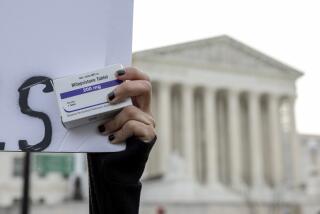U.S. Opposes Order to Pull Paxil TV Ads
- Share via
The Justice Department has asked a federal judge to reconsider an order that GlaxoSmithKline pull all television ads that claim that one of the company’s bestselling drugs is not habit-forming, even though the ads had satisfied the Food and Drug Administration.
The order by U.S. District Judge Mariana Pfaelzer of Los Angeles, issued late Friday, was directed at GlaxoSmithKline’s anti-depression drug Paxil, which accounted for more than $2 billion in sales in 2001. Pfaelzer ruled that television ads for the drug were misleading in that they discounted the severity of withdrawal symptoms.
The ruling came in a lawsuit that was filed a year ago on behalf of 35 patients who said they suffered severe withdrawal symptoms such as nausea, fever and so-called electric zaps to their bodies once they stopped taking Paxil. It would be effective Sept. 1.
The FDA and lawyers for both sides said they had never heard of a judge banning ads that had been approved by the agency.
In its request to Pfaelzer on Tuesday, the Justice Department argued that the FDA had the regulatory responsibility to police drug advertisements. Justice attorneys said Pfaelzer’s ruling sets up a potential conflict between the FDA and federal courts over who can regulate drug advertising. The FDA also issued a protest of the ruling Tuesday.
GlaxoSmithKline also said that the order was improper and that it would appeal, although the company did not say what it planned to do about its ad campaign in the short term. The company already has produced a Paxil ad that avoids the claim that the drug is not habit-forming.
If the ruling stands, experts said it could have a serious effect on the pharmaceutical industry’s $2.5-billion direct-to-consumer marketing campaigns, which potentially would have to pass muster with judges around the country.
GlaxoSmithKline and the FDA viewed the judge’s ruling as a direct assault on the federal regulatory system in which the FDA, and not the courts, has final say on whether print and broadcast advertisements are truthful and accurate. It’s the FDA that has “the expertise and responsibility for reviewing and regulating pharmaceutical ads,” said David Stout, GlaxoSmithKline’s U.S. president of pharmaceuticals.
The FDA issued a statement arguing that the ad ban was “improvidently entered” and contrary to the agency’s regulatory role. An FDA official added that the agency had received copies of GlaxoSmithKline’s advertisement and offered suggestions on it, maintaining that the judge had overreacted to the “not habit-forming” claim and had taken it out of context. The FDA argued that the matter should be referred to the agency.
Pfaelzer has made controversial decisions before: Her ruling in 1997 that California’s Proposition 187 was unconstitutional killed an initiative, approved by nearly 60% of state voters, that would have denied public education, social services and nonemergency health care to illegal immigrants.
The FDA has much stronger and direct authority over drug labels, which must past agency standards before they are released. The FDA has no authority to demand prior approval before an ad goes out, but says its clout with the industry prevents abuse.
Not in this case, argued the plaintiff’s attorney, Karen Barth, who said that although the company changed its label late last year, it continued to run commercials and distribute brochures saying Paxil “may cause mild, usually temporary side effects in some individuals.”
Barth and doctors who supported her case argued that the symptoms were severe and debilitating and occurred regardless of how long the patient had been on Paxil.
“Paxil gives patients much more severe and prolonged problems than they came in with, and those people were assured that there would be no serious problems,” said Dr. Stuart Shipko of Pasadena, one of the plaintiff’s experts.
One plaintiff, Sandra Clark, 52, of Louisville, Ky., said the flu-like symptoms and nausea were so severe that they were worse than morning sickness during pregnancy.
Clark said she was on a 40-milligram-a-day dose of Paxil beginning in January 2000 and began suffering symptoms a year later once she had slowly tapered down to 10 milligrams. She said she was not Paxil-free for six more months, until June 2001.
“I couldn’t drive. I had sensory problems and I needed a caretaker,” she said, adding that she decided to become a plaintiff in the hope “that no one else will have to go though this. To lose a year of your life is just unreal.”
Glaxo’s own physician experts argued that the symptoms were not severe and typical of withdrawal from other drugs in the class, known as selective serotonin re-uptake inhibitors.
Those SSRIs that break down in the body more quickly tend to have the most severe reactions in some patients.
The experts said it was misleading to emphasize the term “habit-forming” on a drug as if it were something that patients maintained a craving for once they stopped using it.
GlaxoSmithKline shares declined $1.41 to $40.59 on the New York Stock Exchange.
More to Read
Sign up for Essential California
The most important California stories and recommendations in your inbox every morning.
You may occasionally receive promotional content from the Los Angeles Times.














